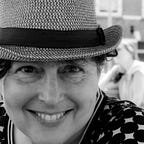Anila Noor is a fighter. She’s a feminist. She’s an activist, a campaigner, a policy maker, a newcomer, and a migrant. She’s a mother, a friend, and a partner.
She’s also the fourth daughter in a family of girls. Her parents had hoped for a boy. When Anila was born her relatives actually cried — and not from joy.
“I guess I was a feminist from the day I was born,” she told us. “From then on, I wanted to be visible. I wanted my life to be important. I was the first female in my family to attend university. I worked as a human rights activist. In other words, I did everything wrong according to the culture I was born into.”
After coming to the Netherlands to complete a masters study, Noor found herself immersed in the experience of forced migration and the challenge of straddling multiple cultures. Her studies focused on forced migration, asylum, refugee policies and advocacy for the rights of migrants. Noor is now working on the subject of receiving refugees in urban settings, particularly here in the Netherlands.
Reflecting on her own surprising journey from development worker in Pakistan to scholar and policy consultant in Europe, Noor tells us that migration “is in my DNA.” She continues:
“My own father made the journey from Kashmir to Pakistan in 1947. Later he was compelled to work in Saudi Arabia in order to earn a living.”
In Pakistan, Noor worked with minority communities and with women who had suffered violence.
“I worked with minorities in Pakistan. I was on the frontlines in support of Malala. I worked with rape victims. Being an activist in Pakistan isn’t as simple as writing a blog post or signing a petition. You have to be a fighter. You sacrifice your family, your life, even your health.”
Coming to the Netherlands provided a physical safety Noor relished. She walked alone on the streets, went out at night, enjoying the freedom of movement. This didn’t stop her from seeing that much needed to be done even here, in a much more inclusive place. This was particularly true for migrants and even more so for migrant women. Noor tells us:
“Since coming here in 2013, I closely observed what happened in the AZCs [Asylum Seeker Centers] of the Netherlands. I saw from the inside how the system works. In 2015, when so many people from Syria were coming to Europe the system was under a lot of pressure. The whole AZC collapsed under the pressure of Syrian refugees. They began to disfavor Iranians, Afghans, and Iraqi refugees. Their applications were either rejected or put aside while people lingered in long waiting periods. Only Eritreans and Syrians were favored.”
Noor felt compelled to Do Something. She saw a need for better representation and more activism from asylum seekers themselves. “I realized that we needed to do more self-advocacy for refugees especially for women. The system turns people into numbers. Many end up depressed, suicidal, and violent.”
Noor formed the New Women’s Impact Hub as a way to reach migrant women and help them discover what they can do. “It’s not a stichting [non-profit organization] or business, it’s a movement,” she states.
Many migrant women arrive in the Netherlands with the hope of entering a more open society, only to find themselves facing familiar patterns of patriarchy and control. The needs of migrant women are often ignored. The men tend to interact more with the Dutch authorities. Often, women find themselves isolated and dependent on their husbands.
The scarcity of housing and other resources can mean that women find themselves coerced into staying in relationships they are not happy with. On top of that, men are favored when it comes to finding work or training. “Dutch society feels so open on the outside,” Noor comments. “But on the inside [the bureaucracy], it can be quite closed.”
In one case, Noor reported the success story of a refugee making a splash as a chef. “When I spoke to him, I learned that his wife does all the cooking. He just brings the food to the table. He earns the money. And once again his wife is dependent on him. She has no access to the economy.”
Recently, Noor was appointed to the European Migrant Advisory Board, which focuses on the Inclusion of Migrants and Refugees. She plans to continue her advocacy to bring more attention to the needs of migrant women. In March, she’ll be all over, from the floor of the EU Parliament in Brussels to Studio/K in Amsterdam on March 11th for the International Women’s Day Festival.
And we’ll be listening to what she has to say.
“I don’t want people to simply hear what I have to say,” Noor tells us. “I want them to think and feel about why I say it: why I have to say it.”
This piece was originally published on womensmarch.nl. The site no longer exists, so I republished it here.
